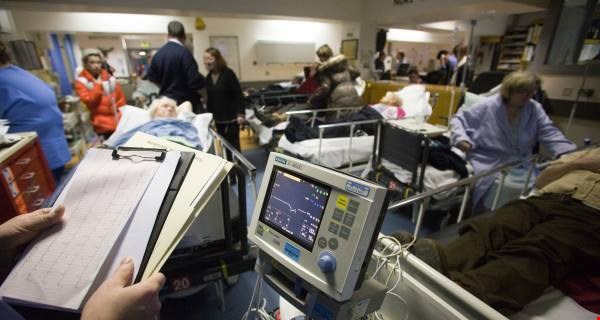72 people are waiting on trolleys at the University Hospital Limerick this Thursday, the highest recorded figure of the 32 hospitals surveyed by the Irish Nurse and Mid Wife Organisation.
The INMO figures revealed that 52 people were on trolleys while a further 20 were located in wards.
According to the frontline medical representatives organisation, Thursday’s figures add to the record breaking figures for the numbers waiting on trolleys at hospitals around the country.
In all, 10,511 patients were waiting for an in-patient bed during March with 3,112 waiting in just one week and 714 patients on trolleys awaiting admission on one day. 191 children also waited on trolleys during the record breaking month.
As part of its drive at national level to address hospital and ED overcrowding, the INMO has sought specifically that the HSE Acute Hospital Division intervenes in hospitals where the trolley numbers are simply out of control, and where local management is not adhering to the ED Agreement of 2016.
This requires site visits which the INMO has requested.
Where implemented correctly, the ED Agreement brokered between the INMO and the HSE in January 2016 has made remarkable improvements and better use of extra beds, both in community and acute hospitals.
As 72 patients waited for a in-patient bed in Limerick, INMO Industrial Relations Officer, Mary Fogarty said that “there is an urgent need for additional nursing staff and more beds. Patient safety and clinical care is compromised due to the inability of the hospital to retain and recruit nurses with 60 nursing vacancies currently confirmed. There is no extra funding for further additional nursing resources to look after the 72 patients today.”
Ms Fogarty went on to say that “The situation is further compounded by the shortage of nursing staff to look after patients and the conditions for those who are ill and the frail elderly are inexcusable,” when speaking of figures in Tipperary.
Fianna Fáil TD for Limerick, Niall Collins said: “Nearly two years on from Minister Harris’ appointment as Minister for Health, we continue to see increases in the number of people lying on trolleys waiting to be admitted to a hospital ward.
“At UHL, a 46 per cent increase between the March 2017 and March 2018 figures, and we have yet to see a coherent plan from the Minister to stem and reduce the numbers of vulnerable people, many of them who are pensioners, lying on trolleys in hospital corridors or in the Emergency Department.
“The plans that Minister Harris has tried to implement have failed. It’s no longer a winter crisis. It’s a 24/7, 365 day of the year crisis, and the victims are vulnerable sick people who just want to be treated in their local hospital.
“More doctors and nurses, more hospital beds in the short term rather than in 10 years’ time, and more supports for older people as they leave hospital can increase the capacity of our health system to treat the growing numbers of citizens requiring hospital-level care,” concluded Collins.
INMO General Secretary, Phil Ni Sheaghdha said that “a figure of 495 was considered a national emergency in 2006. We expect that next week’s figures will be high as our hospitals and staff continue to be overburdened particularly following the bank holiday weekend.
“During the month of March the INMO called for extraordinary measures to be put in place to focus on recovering from the adverse weather event, ensuring prioritisation of emergency care requiring all non-urgent and routine cases to be cancelled during that period. We are now calling for these measures to be implemented again. In this crisis all measures to properly resource and staff the health service must be explored and the assistance of services in the private acute hospitals must also be sought.
“The INMO has sought confirmation that all hospitals are adhering to the nationally agreed escalation policy and remind all employers of the health and safety obligations of the employer in situations where workplaces are overcrowded and pose risks to staff. It is simply not possible for the hospitals, or staff, to continue to provide safe care under these conditions.”
See more Limerick news here










